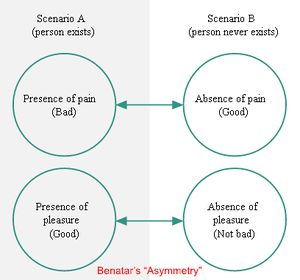Difference between revisions of "Bad Arguments for veganism"
(→Benatar's Asymmetry) |
(→Benatar's Asymmetry) |
||
| Line 18: | Line 18: | ||
</blockquote> | </blockquote> | ||
<br> | <br> | ||
| − | While this argument logically leads to veganism, since the same is as true of non-human animals as humans, the assertion behind it is patently absurd and transparently ad hoc: that is, this supposed "asymmetry" was made up, not deduced, in order to support the beliefs of its advocates. Precisely the opposite can be just as easily asserted. | + | While this argument logically leads to veganism, since the same is as true of non-human animals as humans, the assertion behind it is patently absurd and transparently ad hoc: that is, this supposed "asymmetry" was made up, not deduced, in order to support the beliefs of its advocates. Precisely the opposite can be just as easily asserted.<br> |
| − | Beyond that, the implications of Anti-natalist beliefs are profoundly alienating to people ( | + | Beyond that, the implications of Anti-natalist beliefs are profoundly alienating to people (Which is throwing out the only real benefit of intuition based argument) and may even by dysgenic. See the page on [[Antinatalism]] for more details. |
=Gross-out arguments= | =Gross-out arguments= | ||
Revision as of 22:59, 21 December 2017
Bad argument for veganism are harmful in several ways, partially by displacing good Arguments for veganism, and partially by directly making vegans look irrational or illogical, or even outright dishonest, which negatively influences intelligent non-vegans to reject or even oppose veganism.
See Seven Deadly Sins of Bad Vegan Activism for a more general outline (which goes beyond specific arguments) to bad vegan advocacy.
Contents
NameTheTrait
Benatar's Asymmetry
Also Negative Utilitarianism.
Popular among Anti-natalists, this belief is that there is inherent negative value to life because pain has negative value but pleasure/happiness in short has either no value or inconsistent comparative positive value (such as the absence of pleasure not being bad, but the absence of pain being good) to make up for it.
My view is not merely that the odds favour a negative outcome, but that a negative outcome is guaranteed. The analogy I use is a procreational Russian Roulette in which all the chambers of the gun contain a live bullet. The basis for this claim is an important asymmetry between benefits and harms. The absence of harms is good even if there is nobody to enjoy that absence. However, the absence of a benefit is only bad if there is somebody who is deprived of that benefit. The upshot of this is that coming into existence has no advantages over never coming into existence, whereas never coming into existence has advantages over coming into existence. Thus so long as a life contains some harm, coming into existence is a net harm. -David Benatar[1]
While this argument logically leads to veganism, since the same is as true of non-human animals as humans, the assertion behind it is patently absurd and transparently ad hoc: that is, this supposed "asymmetry" was made up, not deduced, in order to support the beliefs of its advocates. Precisely the opposite can be just as easily asserted.
Beyond that, the implications of Anti-natalist beliefs are profoundly alienating to people (Which is throwing out the only real benefit of intuition based argument) and may even by dysgenic. See the page on Antinatalism for more details.
Gross-out arguments
For example: Eggs are chicken Periods, puss in milk, shit in meat. Regardless of truth, something being subjectively disgusting does not make it objectively wrong. Arguments against homosexuality are a prime example (involving references to anal sex).
However, gross-out arguments can sometimes be related to a good argument about Pathogens, since what is "dirty" is often dangerous in a public-health sense.
Humans are Herbivores
Appeal to nature fallacy. Whether or not we were herbivores (we we herbivores and omnivores, and even mostly carnivorous at various points in our evolution depending on how far you go back) is not relevant to what we should do in terms of ethics. The relevant question is the harm vs. benefit of practices.
Thou Shalt Not Kill
And other simple misinterpretations of scripture.
Scriptural arguments are poor for anybody not part of the religion for which scripture is being used, but even if they are, misinterprting scripture is a short sighted one; all it takes is a simple Google search or a two minute conversation with a priest, pastor, rabbi, imam, or educated believer to reveal the mistake.
"Thou shalt not kill" for example, is better translated as "thou shalt not murder"; in many instances killing is commanded in the Bible, including of humans, as punishment for crime, in war, and in self defense, and different words are used for these. An engagement with this question is a nuanced discussion of blood guilt and the nature of sin against God. There are strong arguments from Jewish, Christian, and Islamic metaphysics (as well as other religions), but they're significantly harder to make than a one-line checkmate.
It can be argued that there is no truth in religion, and all thing scripture are subject to interpretation, but it should be obvious that there are practical limits to the plausibility of different interpretations, particularly when they come down more directly to translation and legal practice and lead less abstractly with the spirit of the text and religious ideals.
